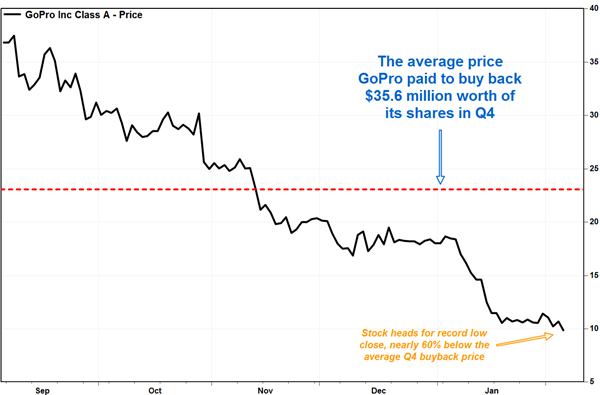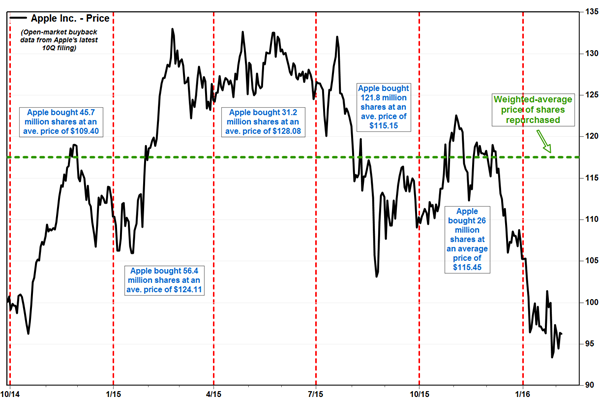|
Share buyback machine remains in overdrive and experts warn it will end
badly
Published: Feb 4, 2016
2:34 p.m. ET
Companies are draining funds with buybacks, instead of investing in growth
|

Getty Images
Is Corporate America
letting its cash drain away?.
|
In the midst of a gloomy earnings season, the share buyback
machine has remained in overdrive, and some experts are cautioning it will
all end badly.
Companies,
even those that are missing profit and sales estimates and cutting
outlooks, or restructuring and cutting jobs, are still announcing
buybacks. Coming after a long period of intensive spending on shareholder
returns, the news is bad for investors hoping to see a return to growth.
“We
continue to be skeptical about how companies are deploying capital,
especially when it’s tied to stock-based compensation,” said Ben
Silverman, vice president of research at InsiderScore, a research firm
that tracks buybacks and legal insider trading for institutional clients.
“We believe buybacks can be used to mask management’s inability to grow
the business and be innovative thinkers.”
William
Lazonick, professor of economics at University of Massachusetts Lowell and
director of the Center for Industrial Competitiveness., went a step
further, suggesting that buybacks have the potential to push the U.S. into
recession. He argues that companies are using them to prop up share prices
at the expense of reinvesting in the business and supporting job stability
and long-term growth.
“It has
the potential to really drive the economy into the ground,” he said.
“Companies have given away so much money, it’s been a long-run secular
problem that has contributed to why income is so concentrated at the top.”
Data shows
that 78% of the total compensation paid to executives at the top 500 U.S.
companies in 2014 went on stock options and stock awards, he said.
“Executives are basically incentivized and rewarded for getting the stock
up, and buybacks are a prime way of doing that,” he said.
The
emergence of aggressive activist hedge funds has exacerbated the problem,
as they deliberately target companies with strong cash flow that can be
strong-armed into distributing those funds.
‘It
behooves people not to look at buybacks as some kind of magic bullet to
put a floor under the stock.’
Ben Silverman, VP at InsiderScore
Many
activist shareholders, including billionaire investor Carl Icahn, have
pushed companies to return more of the cash they hold to shareholders
through share buybacks. The idea is that buybacks boost earnings per share
by reducing the number of outstanding shares, and the additional buying
can raise the share price. However, It doesn’t always work out that way.
For
example, GoPro Inc.
GPRO said late Wednesday that it
spent $35.6 million to buy back stock during the fourth quarter, at an
average price of $23.05, but to little avail.
The
company still reported
a surprise fourth-quarter loss,
and provided a dismal first-quarter sales outlook. And the stock ended the
fourth-quarter $18.01, which was 22% below the average price the company
paid to buy them back.

FactSet
|
On
Thursday, it tumbled 8.5%, toward a record closing low, that was nearly
60% below what the company paid just a few months ago.
“I always
caution retail investors to not get too excited about buybacks, because
what are they doing?” Silverman said. “If the stock price is not
increasing, they’re just repatriating capital without getting additional
value from it.”
Shareholder returns in the form of dividends and buybacks hit a record
$245.7 billion in the third quarter, according to a report Thursday from
Arance (Investment Research), up 4.9% from the year earlier period. On a
trailing 12-month basis, returns to shareholders stood at a record $934.8
billion in the quarter, beating the previous record of $923.3 billion set
in the second quarter of 2015.
“The trend
is expected to continue to reach another record figure of $950 billion for
2015 and may likely touch the trillion-dollar mark,” said Aranca.
Companies
that spent large sums on buybacks in the December quarter may be wishing
they had waited, given the massive across-the-board selloff in January.
“It does
appear to be ill-timed,” said Silverman. “Companies as a group bought into
strength, rather than weakness.”
A good
example of this has been Apple Inc.
AAPL The technology giant
repurchased 281.12 million shares in open-market transactions over the
past five quarters, at a weighted average price of $117.48, according to
an analysis of data provided in the company’s latest quarterly filing.

FactSet
|
The stock
was trading at $96.60 in afternoon trade Thursday, or 18% below the
average price the company paid.
“It
behooves people not to look at buybacks as some kind of magic bullet to
put a floor under the stock,” Silverman said. “At the end of the day, the
market will typically reward companies that run their businesses well.”
|
Copyright
©2016 MarketWatch, Inc. |
|